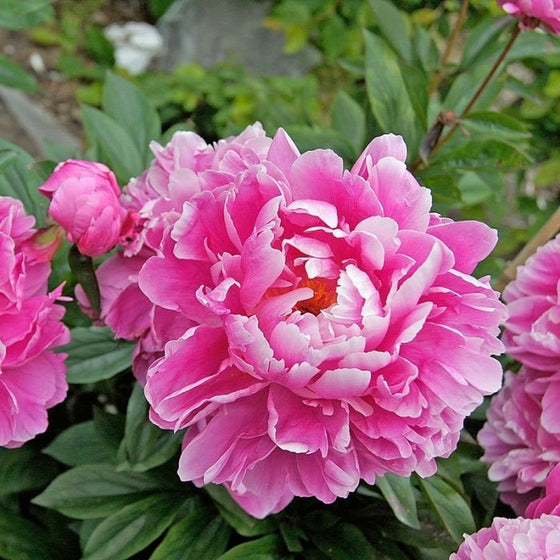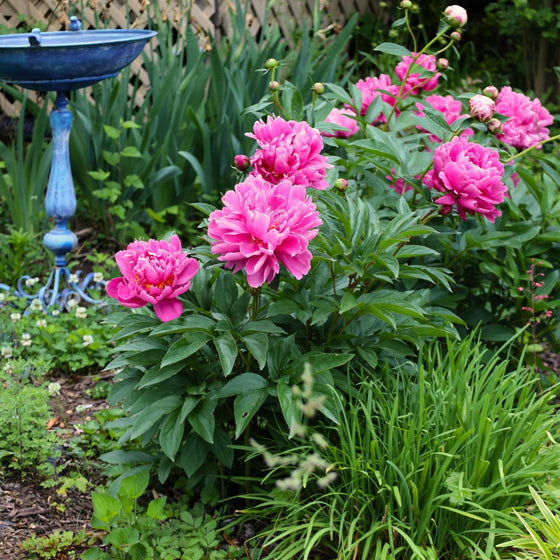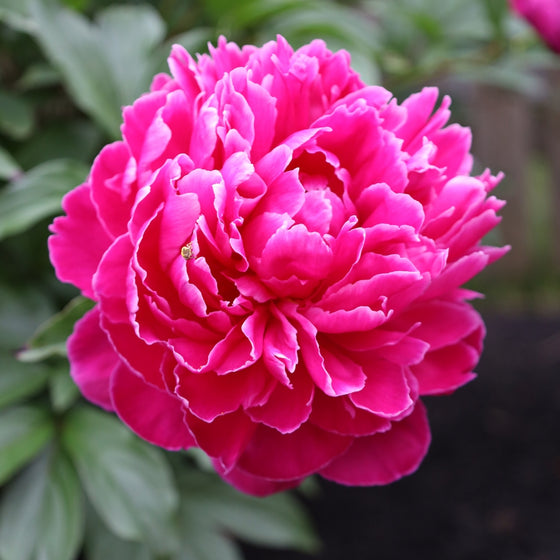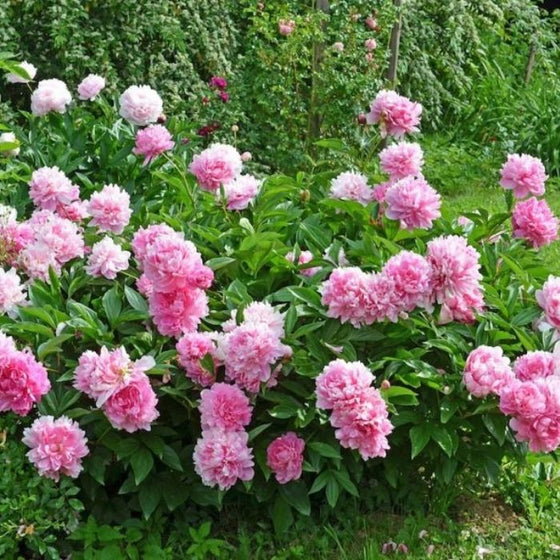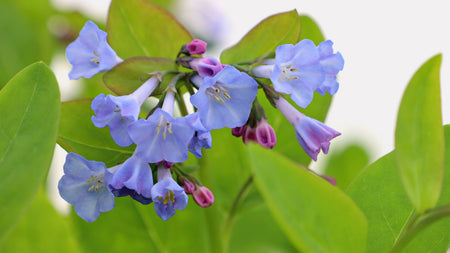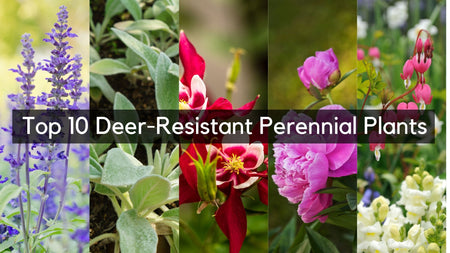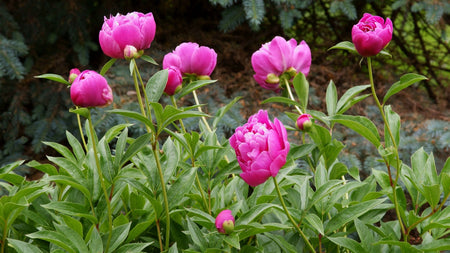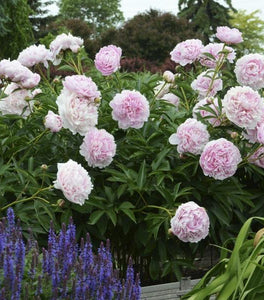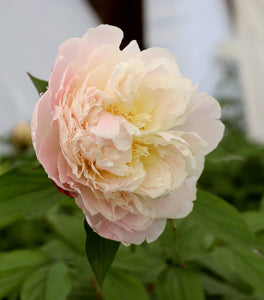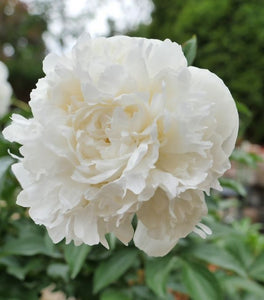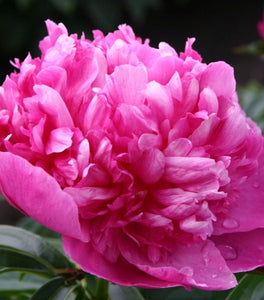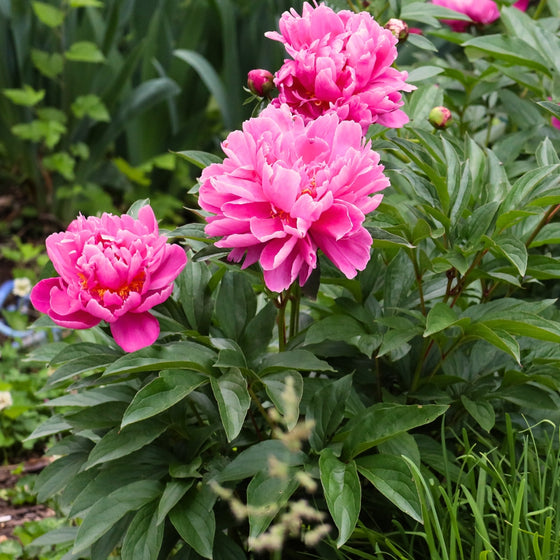
Images Depict Mature Plants
Doctor Alexander Fleming Peony Plants
Dr. Alexander Fleming Peony (Paeonia lactiflora ‘Dr. Alexander Fleming’) is a stunning, heirloom peony known for its large, fragrant, fully double blooms in rich rose-pink hues. Blooming in late spring to early summer, these showy flowers open to reveal layers of delicately ruffled petals that exude a classic peony fragrance. With its romantic color and full form, this peony variety makes a breathtaking focal point in borders, cottage gardens, and cutting gardens alike. Each stem holds its bloom upright with strength and elegance, making it ideal for both in-ground plantings and floral arrangements.
Growing 30 to 36 inches tall and equally wide, Dr. Alexander Fleming Peony thrives in full sun and well-drained, fertile soil. This variety is loved not only for its beauty but also for its durability—it is deer resistant, drought tolerant once established, and cold hardy, performing reliably in USDA Zones 3–8. Its lush, deep green foliage provides a vibrant backdrop to the vivid pink flowers and remains attractive long after the blooms fade. Easy to grow and long-lived, this peony brings dependable color and fragrance to the garden year after year.
Perfect for planting in perennial beds, along walkways, or near patios where its scent can be enjoyed up close, Dr. Alexander Fleming Peony adds timeless charm and vivid color to any sunny landscape. Its large blooms also make it a favorite for cut flower arrangements, filling vases with classic elegance and long-lasting beauty. Whether you're an experienced gardener or a beginner, this peony delivers high-impact blooms with minimal maintenance—an essential addition to any peony collection.
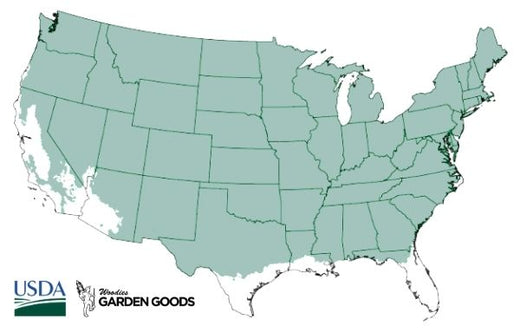
| Hardiness Zone: | 3-8 |
|---|---|
| Mature Height: | 30 to 36 Inches |
| Mature Width: | 2 to 3 Feet |
| Sunlight: | Full sun |
| Water Requirements: | Water well until established |
| Flower Color: | Bright red double form |
| Details: | Bright red flowers, fragrant, good cut flower |
How to Care for Dr. Alexander Fleming Peony
Be sure to read our planting instructions to ensure a healthy and happy Dr. Alexander Fleming Peony plant for years to come!
How do I Plant my Doctor Alexander Fleming Peony Plants?
To plant your Dr. Alexander Fleming Peony successfully, choose a location that receives full sun and offers well-drained, fertile soil—ideal conditions for vigorous growth and abundant blooms. Begin by digging a hole twice as wide and just as deep as the peony's root ball or bare root crown. If planting bare root, position the "eyes" (buds) no more than 1 to 2 inches below the soil surface, as planting too deeply can reduce blooming. Backfill the hole with a mix of native soil and compost or organic matter to improve drainage and fertility, then water thoroughly to help settle the soil around the roots. Space Dr. Alexander Fleming Peony plants about 3 feet apart to allow for proper air circulation and mature growth. After planting, apply a 2- to 3-inch layer of mulch to help retain moisture and suppress weeds, being careful to keep mulch away from the crown to prevent rot. In colder climates, the mulch can also offer some winter protection. These long-lived perennials don’t like to be moved once established, so select a permanent spot where they can thrive for decades. With the right planting approach, your Dr. Alexander Fleming Peonies will reward you with rich, rose-pink blooms and fragrant beauty every spring.
How do I water my Doctor Alexander Fleming Peony Plants?
Watering your Dr. Alexander Fleming Peony plants correctly is essential for establishing a strong root system and ensuring beautiful, abundant blooms. During the first growing season, water deeply once or twice a week, especially during dry periods, to keep the soil consistently moist but not soggy. Focus on soaking the soil at the base of the plant to encourage deep root growth and prevent moisture from lingering on the foliage, which can lead to fungal issues. Early morning watering is ideal, as it allows excess moisture to evaporate throughout the day. Once established, Dr. Alexander Fleming Peonies become more drought-tolerant but will still benefit from occasional watering during hot, dry spells—particularly in late spring and early summer when they’re actively growing and blooming. Avoid overwatering, as peonies prefer well-drained soil and can be sensitive to root rot if left in standing water. Applying a 2–3 inch layer of mulch around the base of the plant helps retain moisture and regulate soil temperature, reducing watering frequency. With proper watering practices, your peonies will reward you with vigorous foliage and stunning rose-pink blooms season after season.
How do I Fertilize my Doctor Alexander Fleming Peony Plants?
Fertilizing your Dr. Alexander Fleming Peony plants at the right time and with the proper nutrients helps ensure lush growth and abundant rose-pink blooms. In early spring, just as new shoots begin to emerge, apply a balanced slow-release fertilizer—such as a 10-10-10 or 5-10-5 formula—around the drip line of the plant, keeping it several inches away from the crown. Water thoroughly after fertilizing to help nutrients soak into the soil and support strong root and stem development. Avoid high-nitrogen fertilizers, as these can lead to excessive leaf growth at the expense of flowering. For long-term soil health, consider supplementing with organic matter like compost or well-aged manure each spring to enrich the soil naturally. A second, light application of fertilizer after blooming can help replenish nutrients and prepare the plant for the next growing season. Be careful not to over-fertilize, as too much can cause weak stems and reduced bloom quality. With a consistent, moderate feeding routine, your Dr. Alexander Fleming Peonies will flourish year after year, delivering their signature large, fragrant pink blooms and maintaining strong, healthy foliage in sunny garden borders or cutting beds.

How and When do I Prune my Doctor Alexander Fleming Peony Plants?
Pruning your Dr. Alexander Fleming Peony plants is an important part of maintaining plant health and encouraging robust blooms year after year. The most crucial time to prune is in the fall, after the foliage has died back naturally—usually following the first frost. At this point, cut all stems down to about 1–2 inches above the soil using clean, sharp pruners. Removing dead leaves and stems prevents the spread of fungal diseases such as botrytis and deters overwintering pests. Dispose of all pruned material away from your garden to maintain a clean growing area. During the growing season, pruning involves minimal maintenance. Deadheading spent blooms after flowering not only improves the plant’s appearance but also helps redirect energy back to the roots for next season’s growth. However, avoid cutting back any green foliage until it has naturally yellowed and wilted in the fall, as the leaves are essential for gathering energy through photosynthesis. With proper seasonal pruning, your Dr. Alexander Fleming Peonies will stay vigorous, disease-resistant, and ready to deliver their signature large, fragrant rose-pink blooms in late spring year after year.

